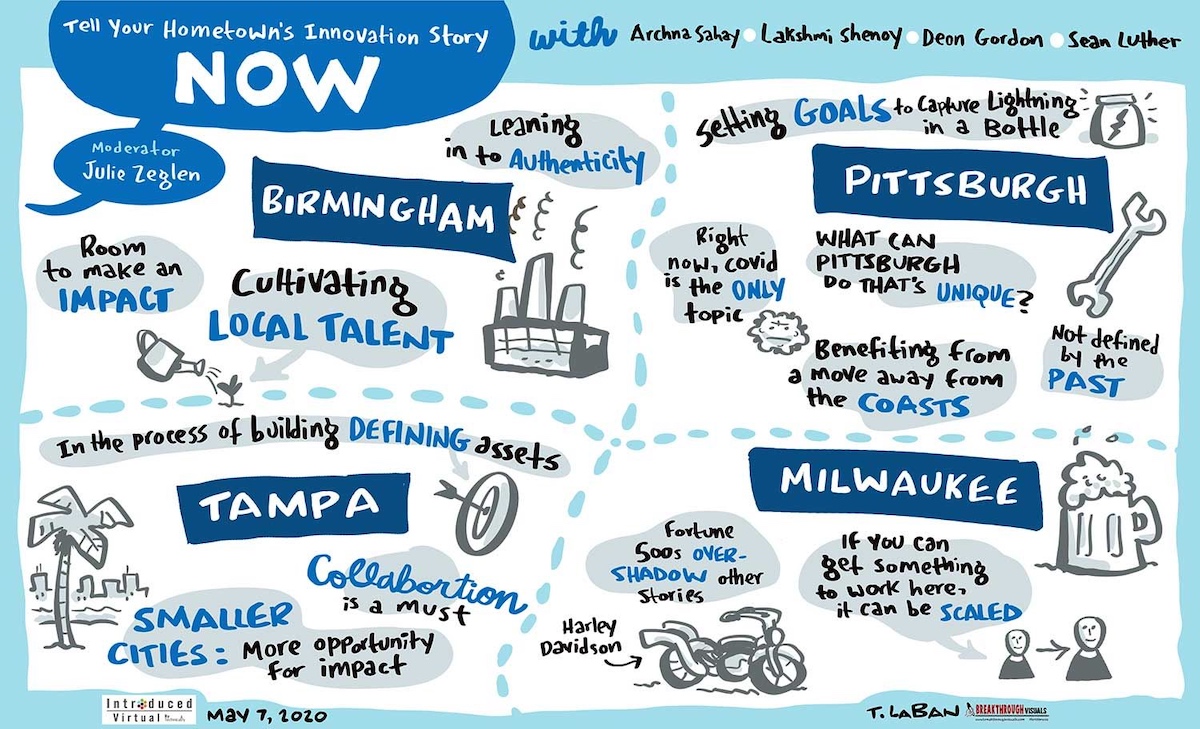What can you do to elevate your city as a great place to work in tech?
All across the country, tech sectors are flourishing outside of the oft-thought-of cities like Boston, Seattle and San Francisco — for instance, in 2020, regions like Baltimore, Arlington and Durham, North Carolina all ranked in the top 10 cities for women in technology.
On May 7, at our first-ever Introduced|Virtual conference, a daylong conference focused on various aspects of building better businesses, we dove into the topic of telling your city’s “innovation story” with folks from Tampa, Milwaukee, Birmingham and Pittsburgh.
With Technical.ly Managing Editor Julie Zeglen moderating, we heard from:
- Deon Gordon, president and CEO of TechBirmingham
- Sean Luther, executive director at InnovatePGH
- Lakshmi Shenoy, CEO of Embarc Collective
- Archna Sahay, president of Sahay Consulting
Check out the full conversation below and read some highlights below:
In normal times, it can be difficult to figure out how to tell your story and the COVID-19 pandemic has made that harder. How do you think about your city?
“Given the unique time period we’re in, all narratives have stopped,” Luther said. “I think that gives us some space to adjust our narratives around our cities.” (Psst, come check out the new Technical.ly Pittsburgh site.)
Sahay agreed, saying that Milwaukee doesn’t do a great job at telling the stories of the non-Fortune 500 companies there. The former Philly resident said right now could be a great time to reset and talk about the way younger companies are having an impact — “and to tell that ‘why Milwaukee’ story for many years to come,” she said. “I didn’t realize the impact of storytelling until I came to a marketplace where it wasn’t as active.”
Gordon said that he often mentions Birmingham’s “last name” of Alabama, and people will automatically write off the innovation and entrepreneurship community because it’s a southern state.
“One of the things that stood out to me is people leaning into authenticity,” he said of what he’s learned. “It’s not that we didn’t have stories to tell, we just weren’t telling them ourselves.”
That includes telling a story that’s appreciative of the past but looks toward the future, he said.
For Shenoy, in Tampa, learning how to tell the city’s story came from realizing that it’s a community that’s recently in a period of growth. As more people are moving to the region, the city’s actual infrastructure is changing.
“Maybe we can accept that our narrative is building, and realizing what our assets are that will really define us,” she said. “And that’s exciting.”
Luther championed smaller, high-energy cities for people in their late 20s or early 30s who are looking to have an impact on their startup scenes and city politics, saying it can be much easier to interface with people in those cities than in places like New York or the Bay area. These cities could be more collaborative and resilient than cities on the coasts.
The message can be more along the lines of “come here and build with us,” he said.
###
Catch the full day of panels on YouTube. Shoutout to Breakthrough Visuals’ Terry LaBan for illustrating our panel live (and watch his process of visualizing Introduced|Virtual’s RealLIST Startups panel live here).
If you’d like to show your appreciation for our free programming and support our independent newsroom, considering donating to the Technical.ly Journalism Fund, of any amount, including the organizational level of $1,000.
Philly Tech Week 2020 is more like Philly Tech Year, with more virtual events like this coming throughout the next few months. Get updates on speakers, sessions, attendee specials and more by signing up for #PTW20 emails today:








